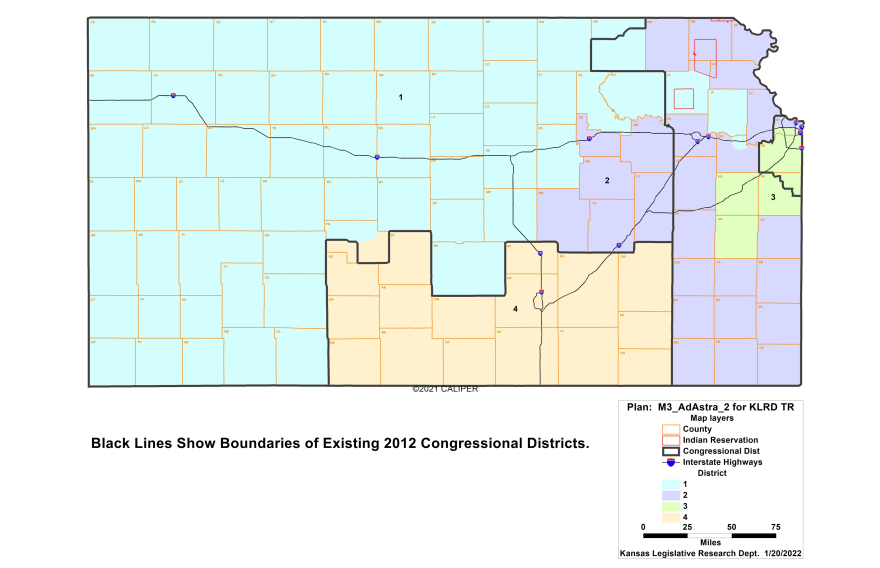The American Civil Liberties Union of Kansas wants the U.S. Supreme Court to force the redrawing on Kansas congressional districts, arguing the state’s high court didn’t account for racial bias.
An ACLU appeal to the nation’s highest court argued the new map used in the 2022 elections reflects a Kansas Supreme Court ruling that “greenlights intentional race discrimination in redistricting.”
The group’s petition comes after the organization lost its challenge to the map in the state court system earlier this year.
Sharon Brett, legal director for ACLU of Kansas, said the recently filed petition argues Kansas justices incorrectly interpreted federal law. The organization contends the map drowns out the votes of racial minorities in Wyandotte County in violation of equal protection laws.
“Because we believe that the Kansas Supreme Court’s ruling was based on an error with regard to federal law,” Brett said, “we have asked the U.S. Supreme Court to step in and correct that federal law error.”
Christopher Gunn, a Washburn University law professor who specializes in elections, said the civil rights group may have a strong argument in the petition because it focuses solely on the racial aspect of redistricting.
Brett and other attorneys originally challenged the map for drowning out the minority vote of Wyandotte County by splitting the county’s residents into two separate districts. They also argued the map was politically gerrymandered in the favor of Republican candidates by shifting the Democratic stronghold of Lawrence into the mostly rural 1st District.
Critics of the map said those moves diluted the power of Democratic voting blocs. Republican lawmakers who crafted the map said the changes to the districts were needed because of population shifts in Kansas.

The Wyandotte District Court agreed with challenges to the new map. District Court Judge Bill Klapper at one point during a trial in April called the evidence that political and racial gerrymandering had occurred “overwhelming.”
In May, the Kansas Supreme Court tossed Klapper’s ruling and reversed the decision.
In its published opinion, the court said the civil rights groups failed to prove Republicans used race as a predominant factor in the redrawing of districts. The court also said that the Kansas Constitution lets lawmakers consider partisanship when drawing new district maps for elections.
Kansas courts had never previously heard a case on whether gerrymandering violates the state constitution. The ruling set a standard for how far one political party in Kansas can gerrymander congressional districts.
However, the new petition to the federal court specifically challenges the state court’s ruling on the racial aspect. In the filing, the ACLU of Kansas argues the ruling allows intentional race discrimination against racial minorities, which would be a violation of the U.S. Constitution’s clause that provides equal protection of the law.
“It is a claim of racial vote dilution,” Brett said, “of intentional race discrimination in the drawing of the maps in a way that dilutes the voices of minority voters.”
Gunn said the group’s argument may be more compelling in federal court than it was in state court. He said the state’s ruling said too few racial minorities were affected by the new district lines to be considered a factor. But that may not pass muster with the U.S. Supreme Court.
“There’s some teeth to this argument,” Gunn said, “because the federal supreme court's jurisprudence on this issue tends toward the notion that it doesn’t matter how many people are being affected.”
The state has until the end of December to respond to the petition before the court will consider taking up the case.
Meanwhile, the alleged political gerrymandering of the map did not make much of a difference during the midterm elections — the first time the map was used.
Democrats feared the new lines would make it more difficult for Democratic U.S. Rep. Sharice Davids to win reelection in the 3rd District that represents the Kansas City area. That would have handed the state’s only Democratic-leaning district over to the Republicans and put all four of the state’s congressional districts in GOP hands.
Despite losing racial minority voting blocs and gaining more rural Republican-leaning areas, Davids still won the district handily — defeating Republican challenger Amanda Adkins for a second time.
Dylan Lysen reports on politics for the Kansas News Service. You can follow him on Twitter @DylanLysen or email him at dlysen (at) kcur (dot) org.
The Kansas News Service is a collaboration of KCUR, Kansas Public Radio, KMUW and High Plains Public Radio focused on health, the social determinants of health and their connection to public policy.
Kansas News Service stories and photos may be republished by news media at no cost with proper attribution and a link to ksnewsservice.org.






